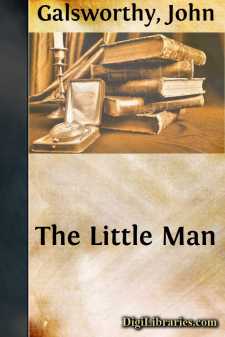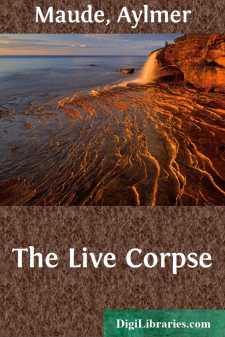Drama Books
Sort by:
by:
John Galsworthy
SCENE I Afternoon, on the departure platform of an Austrian railwaystation. At several little tables outside the buffet personsare taking refreshment, served by a pale young waiter. On aseat against the wall of the buffet a woman of lowly station issitting beside two large bundles, on one of which she has placedher baby, swathed in a black shawl. WAITER. [Approaching a table whereat sit an English...
more...
by:
Aylmer Maude
Scene 1 Protásov's flat in Moscow. The scene represents a small dining-room. Anna Pávlovna, a stout grey-haired lady, tightly laced, is sitting alone at the tea-table on which is a samovár. Enter nurse, carrying a teapot. NURSE. May I have a little hot water, ma'am? ANNA PÁVLOVNA. Yes. How's Baby? NURSE. He's restless.… There's nothing worse than for a lady to nurse her...
more...
by:
Edwin Bjorkman
INTRODUCTION Hermann Bahr, the noted playwright and critic, tried one day to explain the spirit of certain Viennese architecture to a German friend, who persisted in saying: "Yes, yes, but always there remains something that I find curiously foreign." At that moment an old-fashioned Spanish state carriage was coming along the street, probably on its way to or from the imperial palace. The...
more...
by:
Upton Sinclair
ACT I [JULIA PATTERSON'S apartments in a model tenement on the lower East Side. The scene shows the living-room, furnished very plainly, but in the newest taste; "arts and crafts" furniture, portraits of Morris and Ruskin on the walls; a centre table, a couple of easy-chairs, a divan and many book-shelves. The entrance from the outer hall is at centre; entrance to the other rooms right and...
more...
by:
Booth Tarkington
THE FIRST ACT SCENE: The terrace of the Hotel Regina Margherita, on the cliff at Sorrento, overlooking the Bay of Naples. There is a view of the bay and its semi-circular coast-line, dotted with villages; Vesuvius gray in the distance. Across the stage at the rear runs a marble balustrade about three feet high, guarding the edge of the cliff. Upon the left is seen part of one wing of the hotel,...
more...
by:
Bernard Shaw
The twelfth of May, 1796, in north Italy, at Tavazzano, on the road from Lodi to Milan. The afternoon sun is blazing serenely over the plains of Lombardy, treating the Alps with respect and the anthills with indulgence, not incommoded by the basking of the swine and oxen in the villages nor hurt by its cool reception in the churches, but fiercely disdainful of two hordes of mischievous insects which...
more...
by:
Charles Macklin
INTRODUCTION During his extraordinarily long career as an actor, Charles Macklin wrote several plays. The earliest is King Henry VII; or, The Popish Imposter, a tragedy based on the Perkin Warbeck story, performed at Drury Lane 18 January 1745/6 and published the same year. As the Preface states, it "was design'd as a Kind of Mirror to the present Rebellion"; and it provided the author...
more...
by:
William Archer
The Master Builder—or Master Builder Solness, as the title runs in the original—we enter upon the final stage in Ibsen's career. "You are essentially right," the poet wrote to Count Prozor in March 1900, "when you say that the series which closes with the Epilogue (When We Dead Awaken) began with Master Builder Solness." "Ibsen," says Dr. Brahm, "wrote in...
more...
by:
Israel Zangwill
Act I The scene is laid in the living-room of the small home of the Quixanos in the Richmond or non-Jewish borough of New York, about five o'clock of a February afternoon. At centre back is a double street-door giving on a columned veranda in the Colonial style. Nailed on the right-hand door-post gleams a Mezuzah, a tiny metal case, containing a Biblical passage. On the right of the door is a...
more...
MERRY WIVES OF WINDSOR. Besides the copies of the Merry Wives of Windsor appearing in the folios and modern editions, a quarto, Q, has been collated in these Notes, of which the following is the title: The | Merry Wives | of Windsor. | with the humours of Sir John Falstaffe, | as also, The swaggering Vaine of Ancient | Pistoll, and Corporall Nym. |written by William Shake-speare. | Newly corrected. |...
more...











